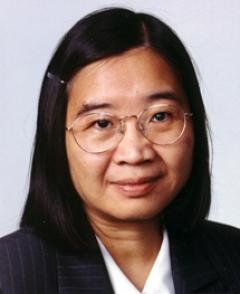
Abstract: Integrating high-performance III-V devices on the mature silicon platform has been a long pursuit over the past few decades. Direct epitaxial growth offers an alternative technology to bonding. Using nano-patterned Si substrates, we created III-V on silicon templates with low defect density and smooth surface morphology for laser growth. Such antiphase-domain (APD)-free III-V on silicon compliant templates with high crystalline quality (benchmarked by narrow XRD halfwidths) are grown without the need of special off-cut substrates and/or Ge buffer. In collaboration with groups at Harvard and UCSB, we have demonstrated optically-pumped micro-disk lasers (MDLs) epitaxially grown on silicon with single mode lasing at communication wavelengths up to room temperature. Growth of the InAs quantum dots (QDs) gain medium was carried out by MBE or MOCVD on compliant templates prepared by MOCVD. Additional defect filtering techniques have been employed to minimize the impact of the highly lattice-mismatched heteroepitaxial growth on (001) silicon. Compared with quantum wells, the multi-stack InAs QDs are less sensitive to residual defects originated from the hetero-interfaces. Use of QDs in a micro-disk resonant cavity with minimized non-radiative surface recombination leads to low-threshold lasing in the MDLs a few microns in diameter. Highly ordered in-plane GaAs and InP nanowires on V-grooved Si are being explored for various device applications.
Biography: Professor Kei May Lau is Fang Professor of Engineering at the Hong Kong University of Science and Technology (HKUST). She received the B.S. and M.S. degrees in physics from the University of Minnesota, Minneapolis, and the Ph.D. degree in Electrical Engineering from Rice University, Houston, Texas. She was on the ECE faculty at the University of Massachusetts/Amherst and initiated MOCVD, compound semiconductor materials and devices programs. Since the fall of 2000, she has been with the ECE Department at HKUST. She established the Photonics Technology Center for R&D effort in III-V materials, optoelectronic, high power, and high-speed devices. Professor Lau is a Fellow of the IEEE, and a recipient of the US National Science Foundation (NSF) Faculty Awards for Women (FAW) Scientists and Engineers (1991) and Croucher Senior Research Fellowship (2008). She is an Editor of the IEEE EDL and Associate Editor of Applied Physics Letters.